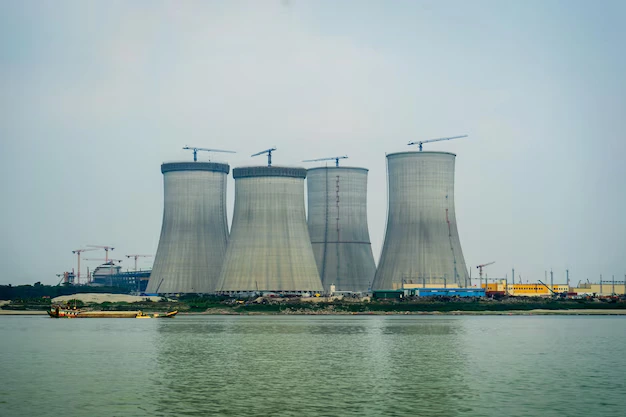Bangladesh’s recent actions have created ripples in international politics. After targeting India repeatedly, Bangladesh has now shifted its focus to Russia, raising corruption allegations against a Russian-backed nuclear power project. This controversy has led to a strong warning from Russia, hinting at escalating tensions between the nations involved.
Backdrop of the Controversy
Bangladesh is constructing the Rooppur Nuclear Power Plant (RNPP) with significant support from Russia and India. This project, anticipated to become operational by 2025, is a crucial step for Bangladesh to achieve energy self-reliance. However, the Yunus government has launched an investigation alleging massive corruption in the project.
Russia outright rejected these allegations, asserting its commitment to defending its reputation and interests. The matter has now escalated to Bangladeshi courts.
Key Details of the Project
- Location: Rooppur, Bangladesh.
This project is considered a game-changer for the nation’s energy needs. - Involvement:
- Russia: Leading the project through its state-owned company, Rosatom.
- India: Providing substantial ground-level construction support through Indian companies.
- Capacity:
- Two units with a combined production capacity of 2.4 GW.
- The first unit is expected to be operational by 2025, with the second following soon after.
Historical Context
Bangladesh’s journey toward nuclear energy began in 2008, initially with an agreement involving China. However, the collaboration did not materialize, paving the way for Russia’s entry. The project promised long-term revenue for Russia while aiding Bangladesh’s development. India’s involvement further strengthened the trilateral cooperation.
Despite these developments, the project faced criticism, particularly from the USA, which has consistently opposed Russian and Indian influence in Bangladesh.
Corruption Allegations: The Core Issue
The Yunus government claims that the Rooppur project has witnessed large-scale corruption, accusing former Prime Minister Sheikh Hasina’s family of misappropriating $5 billion from project funds. These allegations raise several questions:
- Mechanism of Corruption:
Funds allocated for the project were allegedly transferred to foreign accounts of Sheikh Hasina’s family. - Geopolitical Implications:
Bangladesh is seemingly attempting to balance its relations with the USA by scrutinizing projects backed by Russia and India.
Russia’s Response
Russia has categorically denied the allegations, branding them as baseless and politically motivated. It has also issued a stern warning to Bangladesh, signaling readiness to protect its reputation and interests. Russia’s strong reaction highlights the strategic importance of this project in its global energy partnerships.
India’s Role and Concerns
India, a key partner in the Rooppur project, is also likely to face accusations due to its involvement. Bangladeshi authorities may attempt to frame a narrative blaming India for corruption, further straining bilateral relations.
India’s official response is awaited, but the allegations have the potential to disrupt its relations with Bangladesh, especially given the upcoming elections and heightened political tensions in the region.
Geopolitical Context and Implications
- Bangladesh’s Political Climate:
The current government, accused of being pro-USA, is allegedly targeting projects with Russian and Indian involvement to reduce their influence. - Timing of Allegations:
With elections looming and the nuclear plant nearing operational status, the timing raises suspicions about ulterior motives. - Impact on Development:
Halting the Rooppur project would derail Bangladesh’s progress toward energy independence, forcing continued reliance on electricity imports. - US Influence:
The USA’s criticism of the project aligns with its strategic interest in reducing Russian and Indian footholds in Bangladesh.
Future Outlook
The Rooppur project is pivotal for Bangladesh’s development. However, the ongoing corruption investigation and political maneuvers threaten to derail its progress. The following outcomes are likely:
- Prolonged Legal Battles:
The case might remain stuck in courts, delaying the project indefinitely. - Strained Bilateral Relations:
Allegations against Russia and India could sour Bangladesh’s relations with both nations. - Increased US Influence:
By targeting Russia and India, Bangladesh risks aligning more closely with the USA, potentially inviting further geopolitical challenges.
Conclusion
The Rooppur Nuclear Power Plant represents a significant milestone for Bangladesh’s energy ambitions. However, the ongoing allegations, coupled with political and geopolitical dynamics, have cast a shadow over its future. While Russia and India are expected to defend their roles vigorously, the Yunus government’s approach suggests a shift in Bangladesh’s international alignments.
The developments in this case are likely to shape regional politics and the energy landscape for years to come.
Disclaimer:
The views and opinions expressed in this article are based on publicly available information. While every effort has been made to ensure the accuracy of the information presented, the content is intended for informational purposes only and should not be construed as legal, financial, or political advice. The responsibility for interpreting the information rests with the reader. Any action taken based on this content is solely at your own risk.
Also Read: Attack on Agartala-Dhaka-Kolkata Bus Service in Bangladesh
Follow US

